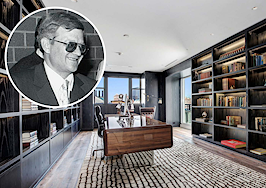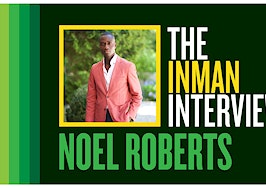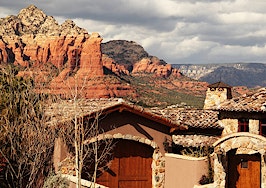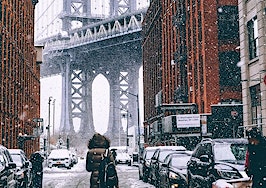While 2020 may have dropped some of the most unpredictable scenarios on the industry, the ebbs-and-flows of the luxury real estate were especially prominent and extreme.
Despite early predictions that the market would stall and holiday homes would be the first to go up for sale in the pandemic, luxury actually saw the biggest boom in years. Amid closures and travel restrictions, affluent buyers looked for comfortable places to quarantine, while the rental market in enclaves like Malibu and the Hamptons exploded. Some even went so far as paying millions for secret underground bunkers with all the top amenities.
It has, above all else, been a year of expectations not aligning with reality — a desire for stylish urban apartments was replaced by mansions and acre-rich rural estates. As buyers’ needs and desires changed rapidly, agents were forced to think on their feet to meet clients’ demands more than ever before.
We’ve put together a list of the biggest luxury news and trends to take place in a year as unprecedented as this one.
Land, space and amenities

Edwin Remsberg | Getty Images
More land, more space and way more amenities were all the rage in 2020. As the coronavirus spread, wealthy buyers sought bigger homes with more rooms and outdoor space to weather out the pandemic.
Features like reliable internet connections and pools came out as top priorities for buyers looking for a property in which to shelter-in-place with their families while working at home.
Throughout the year, agents reported seeing everything from people scouring for homes with good internet connections — sight unseen — to pools and gardens bumping up the value of a rental by 20-30 percent.
Jeff Bezos drops $165 million on a home

Google Maps | Wikimedia
The largest sale of the year landed in February, when Amazon founder and CEO Jeff Bezos dropped $165 million on the historic Warner Estate in Los Angeles.
The sale of the 13,600-square-foot mansion built by Warner Brothers head Jack Warner in the 1930s and last owned by media mogul David Geffen tallied multiple records — the biggest sale of the year in the U.S. and of all time in Los Angeles.
The deal took place off-market and without an agent, which came as a surprise to many luxury real estate professionals working in the city.
Luxury is comfort and service — not a style

Thomas Barwick | Getty Images
The pandemic forced many of us to accept new truths and, in real estate, this came in the form of realizing that luxury is more often comfort rather than a specific style of home. From private jets to cleaning crews brought in both pre- and post-showing, rich buyers went to great lengths to do what they felt would protect them during the pandemic.
While many of these efforts turned out to be excessive and possibly misguided, the year has shown that agents who can offer their clients a sense of security and ability to meet even the most frivolous need will undoubtedly earn their trust (and business!) for years to come.
New, remote locations

WorachatSodsri | Getty Images
As millions of workers were forced to work from home amid the pandemic, those with discretionary income realized that they could do it in style — and for the long term — in remote luxury settings far from Los Angeles or New York.
While travel restrictions made sales in Hawaii and the Bahamas impossible for all but the most elite, agents in places like Arizona and Southern Florida were inundated with inquiries about local properties. Some Americans, meanwhile, opted to flee the country entirely, buying dwellings as varied as an apartment in Paris or a bunker in New Zealand. Bunkers as a whole saw a major boost in popularity as some Silicon Valley executives paid millions to wait out the pandemic underground in comfort.
An industry needs to ask hard questions

Viktoriia Hnatiuk | Getty Images
Long known for celebrating excess and exclusivity, luxury real estate tastemakers and trendsetters took a hard look at how they conducted business as unemployment soared, a pandemic roared and summer protests grew in size.
Old marketing strategies like posing in front of Ferraris and bottles of champagne made way for more modest pitches focused on family, home and comfort.
The age of the rental

A vacation rental managed by Finger Lakes Premier Properties. Credit: Finger Lakes Premier Properties
Rentals, even ones that, like in some parts of the Hamptons, go for $1 million a season, were once pooh-poohed by many a luxury agent believing that sales were the best way to make money and establish credibility in the business.
Amid the uncertainty of the pandemic, affluent buyers began looking for homes that could serve as mini-getaways for their families. Demand for large, amenity-rich long-term rentals skyrocketed and, as Compass’ Sally Forster Jones pointed out, forced many luxury agents to reconsider what they could offer their clients.
Luxury Lens Newsletter

Inman
In May, Inman launched its Luxury Lens newsletter to keep readers up to date with all the exciting but often tumultuous news rocking luxury real estate.
Published each Friday, the email newsletter quickly became a reader favorite and features interviews with industry leaders like Compass’ Aaron Kirman and The Agency’s Mauricio Umansky, deep dives into cities with bursting markets and analysis of the current luxury trends. Sign up to keep on top of all the latest luxury happenings HERE.
Moguls exchange homes

Katzenberg Estate | Google Maps
Back in August, former CEO of DreamWorks Animation Jeffrey Katzenberg sold a 26,000-square-foot estate in LA’s Trousdale Estates to WhatsApp co-founder Jan Koum for $125 million.
Katzenberg and his wife Marilyn bought the lot just a short drive away from the iconic Greystone Mansion for $35 million back in 2009 and had celebrity architect Howard Backen turn it into the current sprawling U-shaped estate. The entire deal was unlisted and shrouded in secrecy, but news of the sale first started to emerge in whispers in mid-August.
Luxury strategies go mainstream in pandemic

virtual tour, selfie stick
Many of the processes — virtual tours, appointment-only viewings — that agents around the world had to adopt as a response to the pandemic were already common practice in the ultra-high-end market.
When the pandemic hit and offices were forced to close, it proved an easier adjustment for many luxury agents already used to working with clients who flit between cities and buy remotely. As many agents pointed out in 2020, this type of remote-until-the-last-step approach for selling real estate has become mainstream by necessity and is unlikely to change even as businesses reopen.
Waiting for something better

Getty Images and Artist GND Photography
While what “returning to normal” means differs monumentally for different people, the year has been one in which both buyers and agents are waiting for something to change: travel restrictions to ease so they can buy a house, prices to drop so that those who are priced out can get into the market and, of course, offices to reopen.
Even with the luxury market as strong as it has been all year, buyers and sellers alike are uneasy about the uncertainty and hope that the upcoming vaccine will bring more clarity about what will prove to be a good investment in the long term.













